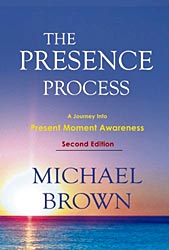 
Like breathing, we think we know how to feel.
Unfortunately this is not so. The only thing that we can do very well
is responding very quickly to a perceived feeling or emotion to get
rid of this feeling and emotion as soon as possible.
Thinking Monkeys.
We are 'Thinking Monkeys'. We put everything we experience,
feel and go through into words — spoken or thought — and
within a nanosecond we make it into a story. Then we say or think:
I feel 'this or that'.
Then this feeling is no more something that is seemingly so but it
has become something that has an emotional value and impact; something
that is almost tangible. We make it an 'object' which we project almost
automatically onto our environment. Subsequently we attach ourselves
to that 'object' and we identify ourselves with it. This creates our
story that tells us why we feel 'this or that':
I feel 'this and that' because 'they' did 'this or
that', and... (et cetera)
Or:
I feel 'this and that' because 'so and so' happened
because of 'this and that' reason, because... (et cetera)
We do not do this intentionally, it is something that happens unconsciously.
We experience the emotion and immediately we have articulated it and
the story is created. Everybody does this within a nanosecond and
everybody is completely unaware of it.
Once the story is created we stop working with the emotion and only
concern us with the fabricated story. We convince ourselves that everything
we feel and experience is always the fault of- or done to us by someone
or something outside of ourselves. Next we begin to try and change
that something or someone to ensure that we do not or won't ever have
to experience this 'feeling' or 'emotion' again.
Not Outside of Us.
The emotion we experience, the feeling that we have, everything
we go through is never caused by something or someone in our outer
world. It always comes from within ourselves and can never be solved
or processed by changing something or someone outside of us —
that would be like combing the hair of the image in the mirror when
you're having a bad hair day.
As long as it's about positive emotions there is not a big problem,
but once it comes to negative emotions we begin to feel discontent.
We are angry at the person or event in the outside world whereof the
fictional story claims that 'this person' or 'that event'
is responsible for the rotten feeling that we have — and that
is simply not true.
If we are able to see that every emotion we experience is never caused
by something or someone in our outside world, then we must accept
that the emotion comes from within ourselves. The first question that
comes to mind when we realize and accept this, is:
Why do I feel this way?
This seems a legitimate question, but it is not. At the exact moment
we ask that question and try to answer it we create a new story. The
only thing that such a question can provide is that we look at our
past or at sometime in the future to answer the question, looking
for a reason why we feel the way we feel, and this is a new story
that gets us nowhere real fast.
The question that does make sense, is:
When was the last time I felt like this?
Now, do not try to remember when that was. Just be open to the possibility
that the answer will come to you naturally.
When you have given this a chance for a while, ask yourself:
When was the first time I felt like this?
Again, do not try to remember when that could have been and just be
open to the possibility that the answer will come to you naturally.
Even though the past is gone and there is nothing you can do to change
or improve it, you can, by giving the emotion the chance to go back
into your past, integrate this emotion into the person you are now.
I will not explain how that works. If you want to know this, you can
read it in the recommended reading down the page, but you'll be surprised
how well this works if you do it seriously. You do not have to understand
how things work. Just try it and if it works, it obviously works.
The Method.
In order to do something positive with any emotion we must
feel the emotion without judging it, so it can be
integrated into the 'body-mind system'. The method I know of that
does work, goes as follows:
- Go sit somewhere where you will not be distracted or disturbed;
- Concentrate on your breathing to relax;
- Experience how the emotion really feels. Do not articulate
how the emotion feels, do not tell yourself what the emotion is
called or where the emotion comes from, but feel the emotion without
having an opinion about it; let the emotion just be as it is and
feel how it feels.
- Ask yourself when you had this emotion for the last time and
let the answer come to you naturally.
- Ask yourself when you had this emotion for the first time and
let the answer come to you naturally.
In short: if you feel like shit, feel how 'feeling like shit' feels
without calling it 'feeling like shit' or assess it as 'negative'
or think about where 'feeling like shit' comes from. This is not easy
and it can be very confronting, but it's definitely worth it.
You will find it will gradually become easier to see through 'the
story' of your emotions and just let it be. Sometimes you may have
to laugh heartily, but it can also be that you will burst into tears.
Each physical reaction is okay, you cannot do it wrong. Don't judge
the reaction either.
Faster and faster you will feel and view the emotion for what it actually
is and experience it without words, without judgment, without opinion.
Soon you will be able to let the emotion just be without you interfering
with it and the emotion can be integrated into your 'body-mind system'.

Recommended Reading:
 |
The Presence Proces
by
Michael Brown |
|



















 |


